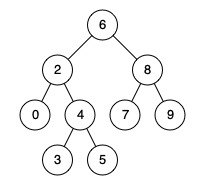235. Lowest Common Ancestor of a Binary Search Tree (Easy)
https://leetcode.com/problems/lowest-common-ancestor-of-a-binary-search-tree/
Given a binary search tree (BST), find the lowest common ancestor (LCA) of two given nodes in the BST.
According to the definition of LCA on Wikipedia: “The lowest common ancestor is defined between two nodes p and q as the lowest node in T that has both p and q as descendants (where we allow a node to be a descendant of itself).”
Given binary search tree: root = [6,2,8,0,4,7,9,null,null,3,5]

Example 1:
Input: root = [6,2,8,0,4,7,9,null,null,3,5], p = 2, q = 8 Output: 6 Explanation: The LCA of nodes2and8is6.
Example 2:
Input: root = [6,2,8,0,4,7,9,null,null,3,5], p = 2, q = 4 Output: 2 Explanation: The LCA of nodes2and4is2, since a node can be a descendant of itself according to the LCA definition.
Note:
- All of the nodes' values will be unique.
- p and q are different and both values will exist in the BST.
Solutions
1.
class Solution {
public TreeNode lowestCommonAncestor(TreeNode root, TreeNode p, TreeNode q) {
if (root == null) {
return null;
}
List<TreeNode> pTrack = new ArrayList<>();
List<TreeNode> qTrack = new ArrayList<>();
// Get the track to p and q nodes
searchNode(root, p, pTrack);
searchNode(root, q, qTrack);
int lenp = pTrack.size();
int lenq = qTrack.size();
int len = Math.min(lenp, lenq);
// Find the first different node before which is the lowest common ancestor.
for (int i = 0; i < len; i++) {
if (pTrack.get(i).val != qTrack.get(i).val) {
return pTrack.get(i - 1);
}
}
// Certain one is the prefix of another.
return pTrack.get(len - 1);
}
private void searchNode(TreeNode root, TreeNode x, List<TreeNode> track) {
track.add(root);
if (root == null) {
return;
}
if (root.val == x.val) {
return;
}
if (root.val > x.val) {
searchNode(root.left, x, track);
} else {
searchNode(root.right, x, track);
}
}
}
2.
class Solution {
public TreeNode lowestCommonAncestor(TreeNode root, TreeNode p, TreeNode q) {
// Value of current node or parent node.
int parentVal = root.val;
// Value of p
int pVal = p.val;
// Value of q;
int qVal = q.val;
// If both p and q are greater than parent
if (pVal > parentVal && qVal > parentVal) {
return lowestCommonAncestor(root.right, p, q);
}
// If both p and q are lesser than parent
if (pVal < parentVal && qVal < parentVal) {
return lowestCommonAncestor(root.left, p, q);
}
// We have found the split point, i.e. the LCA node.
return root;
}
}